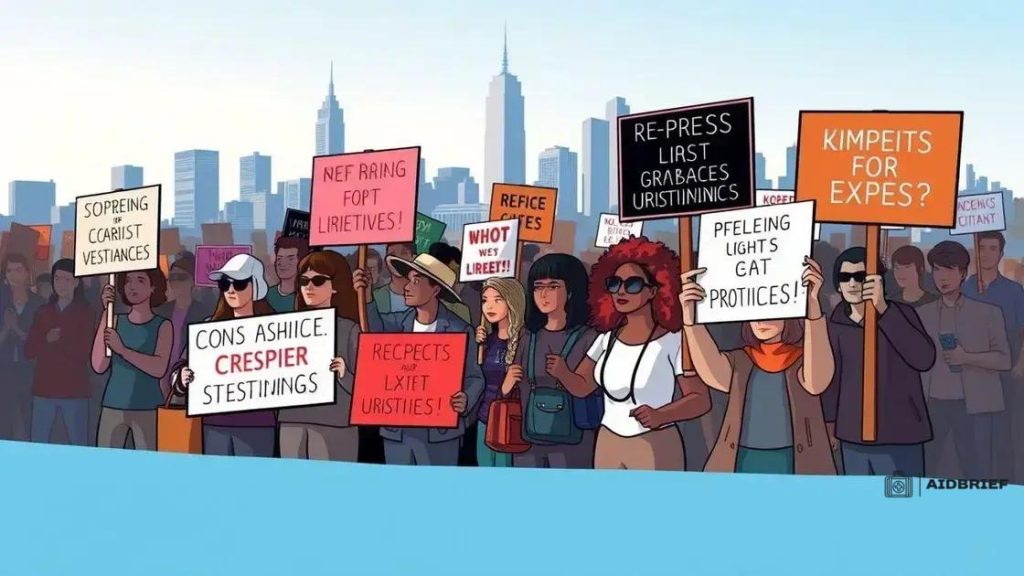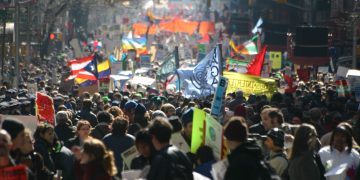Constitutional rights protests: Why they matter now

Constitutional rights protests are organized demonstrations aimed at advocating for the protection and promotion of individual rights, often facilitated by social media, which amplifies voices and fosters rapid mobilization for various social causes.
In recent years, constitutional rights protests have taken center stage, sparking discussions across communities. Have you ever wondered how these movements shape our society and influence change? In this article, we dive into their importance and implications.
Understanding constitutional rights
Understanding constitutional rights is essential for every citizen. These rights lay the foundation for a democratic society. They establish the framework for freedom, ensuring that individuals can express themselves, practice their beliefs, and have access to justice.
What Are Constitutional Rights?
Constitutional rights refer to the rights granted to individuals by the Constitution. In the United States, these rights are primarily found in the Bill of Rights, which comprises the first ten amendments. Each amendment protects specific freedoms and rights such as freedom of speech, religion, and the right to bear arms.
Importance of Constitutional Rights
Without these rights, citizens could face oppression and injustices. Constitutional rights empower individuals to challenge authority and advocate for change. They act as a shield against government actions that may infringe upon personal freedoms.
Key Aspects of Constitutional Rights
- Protection of individual freedoms
- Promotion of equality and justice
- Limiting government power
- Providing a framework for social movements
The impact of constitutional rights extends to various aspects of society. They inspire movements and facilitate dialogue about justice and equality. For example, when people protest, they often invoke their constitutional rights to assemble peacefully and express their views. This highlights the ongoing significance of these rights in advocating for change.
As society evolves, so does the interpretation and application of constitutional rights. Courts play a critical role in interpreting these rights and ensuring that they adapt to contemporary issues. Understanding these developments is vital for recognizing how laws affect daily life and civil liberties.
Engaging in discussions about constitutional rights often leads to greater awareness and active participation. By knowing your rights, you can better defend them and support others in doing the same.
The role of protests in democracy
The role of protests in a democracy is crucial for expressing public opinions. Protests serve as a platform for individuals to voice their concerns about various issues. They highlight social injustices and push for changes in legislation and policy. Everyone has the right to dissent, and protests embody this fundamental aspect of democratic societies.
Protests as a Form of Expression
In a democratic society, citizens can express their views freely. Protests give a collective voice to those who might otherwise go unheard. These movements can engage communities and spark conversations about essential topics. When people come together to advocate for change, they demonstrate the power of unity.
Historical Impact of Protests
Many significant changes in history stem from protests. For instance, the Civil Rights Movement in the 1960s mobilized citizens to demand equality and justice. Through peaceful protests and marches, activists raised awareness about racial discrimination and ultimately influenced legislation.
- Protests can highlight social issues
- They mobilize communities for a common cause
- They often lead to legislative changes
- They empower marginalized voices
Besides advocating for specific causes, protests also play a vital role in holding governments accountable. When citizens protest, they send a message that they are engaged and informed. This engagement is important for maintaining a healthy democracy. It encourages elected officials to listen to their constituents and act in the best interest of the public.
Moreover, social media has transformed the landscape of protests. Activists can spread awareness quickly and organize events more efficiently. This modern approach aids in gathering support and facilitates connections between various movements, strengthening their impact.
As we observe the ongoing movements across the globe, it is clear that protests will continue to be a vital component of democracy. They remind us that it is the responsibility of citizens to actively participate in shaping the future.
Historical context of rights protests

The historical context of rights protests reveals the ongoing struggle for equality and justice. Throughout history, people have gathered to demand their rights and challenge oppressive systems. Whether through peaceful demonstrations or more aggressive forms of protest, these actions have shaped societies.
Significant Movements
Many critical movements have emerged over the years, highlighting the importance of rights protests. For instance, the Women’s Suffrage Movement fought for women to gain the right to vote. This struggle unfolded in the late 19th and early 20th centuries and exemplified the power of collective action.
Lessons from the Past
Similarly, the Civil Rights Movement of the 1950s and 1960s in the United States focused on ending racial segregation and discrimination. Activists like Martin Luther King Jr. led peaceful protests, marches, and sit-ins. Events such as the March on Washington in 1963 galvanized the nation and showcased the necessity of protests in effecting change.
- Protests can catalyze social change.
- They raise awareness about critical issues.
- Activism often leads to important legislation.
- Rights protests inspire future generations.
These movements remind us that the pursuit of rights is often met with resistance. Protesters have faced challenges, including police brutality and societal pushback. Yet their determination has led to lasting impacts on laws and human rights.
Looking at global history, we can see similar patterns. From anti-apartheid protests in South Africa to the fight for LGBTQ+ rights around the world, these struggles are interconnected. Each represents a desire for justice and equality that transcends borders.
The ongoing fight for rights protests today continues the legacy of those who came before us. By understanding this historical context, we can appreciate the significance of current movements. They are not just individual events but part of a larger tapestry of human rights activism.
Major protests in recent years
Major protests in recent years have highlighted the ongoing fight for constitutional rights across the globe. These protests often reflect societal issues and the demand for justice. From climate change to racial equality, activists have taken to the streets to make their voices heard.
The Black Lives Matter Movement
One of the most significant protests in recent history is the Black Lives Matter (BLM) movement. Sparked by the tragic death of George Floyd in 2020, protests erupted worldwide. Demonstrators marched to demand justice against systemic racism and police brutality. The movement fueled a global conversation about race and inequality, urging people to confront hard truths.
Climate Change Activism
Another major wave of protests has centered around climate change. Young activists like Greta Thunberg have led the charge, calling on governments to take immediate action. The Fridays for Future protests mobilized millions globally, emphasizing the urgent need for sustainable practices. These demonstrations not only raise awareness but also demand accountability from leaders.
- Protests can bring people together for a common cause.
- They create a platform for marginalized voices.
- Major protests often lead to meaningful policy changes.
- Social media amplifies the reach of protest movements.
In addition, the Women’s March brought attention to women’s rights and gender equality. Following the 2016 election in the United States, crowds gathered in cities across the country to advocate for women’s rights. This protest demonstrated the power of collective action in striving for gender equity.
These examples show that recent protests are not isolated incidents. They often connect to broader movements, pushing for substantial change in various areas. Activism today is deeply interconnected, fueled by the desires for justice and equality.
As these major protests continue to unfold, they remind us of the importance of civic engagement. Each protest serves as a reminder that people’s voices matter and that there is power in solidarity.
The impact of social media on activism
The impact of social media on activism has transformed the way people organize and respond to social issues. With platforms like Twitter, Facebook, and Instagram, individuals can share their messages rapidly. This instant communication increases the visibility of important causes, allowing more people to join the conversation.
Raising Awareness
Social media is a powerful tool for raising awareness about various movements. Activists use hashtags to create online communities and promote their causes. For example, hashtags like #BlackLivesMatter and #MeToo have mobilized millions globally, granting a voice to those often marginalized.
Instant Mobilization
Another significant aspect is the ability to organize protests quickly. Activists can share event details instantly, allowing for rapid mobilization of supporters. This reality enables spontaneous protests to arise, which can keep momentum going on crucial issues.
- Social media increases accessibility to information.
- It fosters connections across diverse communities.
- Messages can spread rapidly, reaching vast audiences.
- Activists can share their stories directly, making them more relatable.
Additionally, social media platforms serve as a space for dialogue. Comments and shares create discussions that can lead to greater understanding of complex issues. Through engaging posts, people can educate themselves and others about injustices affecting different communities.
Furthermore, social media campaigns can attract mainstream media attention, further amplifying the message. When a protest goes viral, it can lead to more extensive coverage, compelling political leaders to address the issues at hand. This amplification shows how interconnected activism and digital communication have become.
However, challenges exist. Misinformation can spread just as quickly, leading to confusion about important topics. Activists must navigate this landscape carefully, ensuring that accurate information reaches their audiences.
Ultimately, the role of social media in activism is pivotal. By harnessing these platforms, activists can bring about significant change and inspire a new generation of advocates.
FAQ – Frequently Asked Questions About Constitutional Rights Protests
What are constitutional rights protests?
Constitutional rights protests are demonstrations aimed at raising awareness and advocating for the protection and promotion of individual rights guaranteed by the Constitution.
How has social media impacted activism?
Social media has significantly impacted activism by providing platforms for rapid communication, enabling organizations to mobilize supporters quickly and raising awareness for various causes.
What are some major movements in recent years?
Major movements include Black Lives Matter, climate change protests, and the Women’s March, all of which address pressing social issues and have sparked significant public dialogue.
Why are protests important in a democracy?
Protests play a crucial role in democracy by allowing citizens to express their opinions, advocate for change, and hold governments accountable for their actions.





